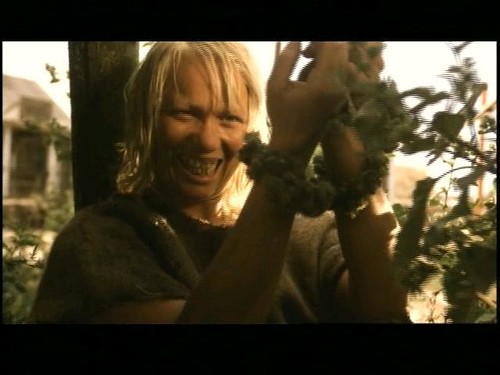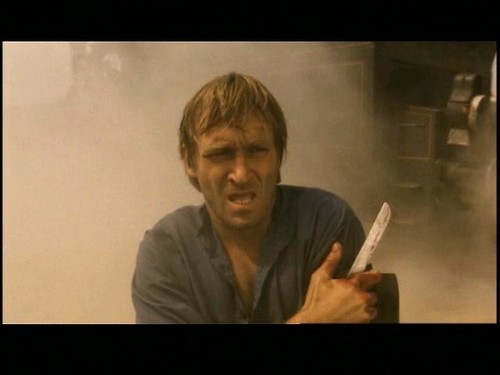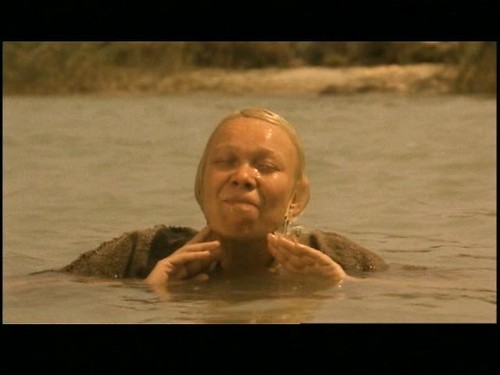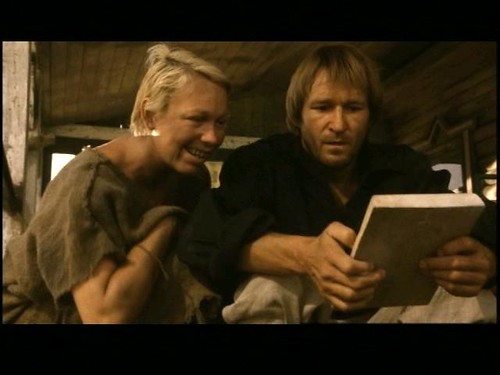Sztálin menyasszonya (Stalin’s Bride) * *
 Péter Bacsó is a Hungarian director who specializes in tragicomedies about social issues, especially issues concerning totalitarianism and an over-powerful police state. Two of his highly-regarded films are Te rongyos élet (Oh, Bloody Life, 1983) and A Tanú (The Witness, 1969), a satirical anti-Stalin film that was banned for 9 years. He particularly writes films about life under totalitarianism. Peter Bacso: "Our [meaning he and his screenwriter] films always go back to the 50's, because our greatest problem is to not return to what we were in that era. It's our responsibility to speak in cinema of things we can't say in politics or science."
Péter Bacsó is a Hungarian director who specializes in tragicomedies about social issues, especially issues concerning totalitarianism and an over-powerful police state. Two of his highly-regarded films are Te rongyos élet (Oh, Bloody Life, 1983) and A Tanú (The Witness, 1969), a satirical anti-Stalin film that was banned for 9 years. He particularly writes films about life under totalitarianism. Peter Bacso: "Our [meaning he and his screenwriter] films always go back to the 50's, because our greatest problem is to not return to what we were in that era. It's our responsibility to speak in cinema of things we can't say in politics or science."The summary of this film on the DVD cover distributed by Facets is “A young, maligned woman, nicknamed Stalin's Bride, by the cruel townsfolk, is taken away by the authorities thanks to her nickname. She gets her just desserts, though, when she returns to town to face her tormenters.” This doesn’t even begin to describe this movie. Did they watch the film or know anything about Bacso’s films? This movie is set in 1937 in the Ukraine, during and a few years after the forced collectivization of the peasants. The movie opens as peasants are turning in their private property – for the “state”. A man, Zorka, gives up his prize racehorse.
 The man leading the horse into the train begins to beat the horse, and after an altercation, Zorka knifes and presumably kills the man. As he is being led away, a dazed woman dressed in a burlap bag is found in the train.
The man leading the horse into the train begins to beat the horse, and after an altercation, Zorka knifes and presumably kills the man. As he is being led away, a dazed woman dressed in a burlap bag is found in the train.  Paranya. That is what she is called. Paranya has the intelligence and innocent outlook on life of a toddler. She takes up residence in the town, and we see her as she wanders about, playing with the children, scrounging for food, chasing the geese, and occasionally being frightened and harassed by some young men in the village. Nonetheless, the villagers generally take care of her, so it is not an entirely cruel relationship. But one day, things begin to spiral out of control when Piranya calls Stalin her fiancée. She is being tormented by the village bullies again, and runs to a picture of Stalin, and cries out ‘Stalin protect me! Stalin, my fiancée!’ A policeman overhears this, and by the time his report gets to headquarters, Paranya is arrested and turned over to the secret police because...well...you can't take chances when your head is on the line. The secret policeman who interrogates her is a bit insecure in his position, and he can't afford to take any chances. She is a capitalist spy(@!?), and he will not let her trick him. She is tortured in order to force her to speak and reveal her mission. Since she can speak all of five words, this is simply not possible. Yet, they cruelly torture her nonetheless.
Paranya. That is what she is called. Paranya has the intelligence and innocent outlook on life of a toddler. She takes up residence in the town, and we see her as she wanders about, playing with the children, scrounging for food, chasing the geese, and occasionally being frightened and harassed by some young men in the village. Nonetheless, the villagers generally take care of her, so it is not an entirely cruel relationship. But one day, things begin to spiral out of control when Piranya calls Stalin her fiancée. She is being tormented by the village bullies again, and runs to a picture of Stalin, and cries out ‘Stalin protect me! Stalin, my fiancée!’ A policeman overhears this, and by the time his report gets to headquarters, Paranya is arrested and turned over to the secret police because...well...you can't take chances when your head is on the line. The secret policeman who interrogates her is a bit insecure in his position, and he can't afford to take any chances. She is a capitalist spy(@!?), and he will not let her trick him. She is tortured in order to force her to speak and reveal her mission. Since she can speak all of five words, this is simply not possible. Yet, they cruelly torture her nonetheless.  When she is finally released back to the village, she is traumatized and when she sees something that reminds her of torture, she yells out uncontrollably the words they said to her while in jail, “Spy! Take her away. Spy! Spy!” The authorities take these outbursts seriously, and slowly random townfolk are arrested. In the end Zorka and Paranya – these two souls irreversibly damaged by the cruelty of the State -- are reunited in a sad conclusion.
When she is finally released back to the village, she is traumatized and when she sees something that reminds her of torture, she yells out uncontrollably the words they said to her while in jail, “Spy! Take her away. Spy! Spy!” The authorities take these outbursts seriously, and slowly random townfolk are arrested. In the end Zorka and Paranya – these two souls irreversibly damaged by the cruelty of the State -- are reunited in a sad conclusion.The movie is about the destruction of people by a cruel and capricious State, a State that is so paranoid that it tortures an innocent and obviously simple woman. It unable for a second to see common sense.
My personal thoughts
This movie was painful to watch. Although the women villagers generally take care of Paranya, she is cruelly teased by the young men and that is hard to watch. Her torture in jail is also difficult, although it is not as explicit and ‘in your face’ as it could be. The movie also suffers from a variety of issues. The actress playing Paranya was ok, but I was aware that she was an actress. There subplot involving Zorka is either weak or its playing on some cultural reference (like some stock Russian peasant stereotype) that I couldn’t decipher. He kills a man early on, but later he is played as a "lost soul" (am I missing something? Looked to me like he murdered someone in plain view of the whole town...).
I wanted to see the film because I’m into eastern European films that explore the personal aspects of the political tragedies of the 20th century: WWI, WWII, and occupation and totalitarianism. Hungarian directors are known for making philosophical films and reflective films that try to make sense of this experience. So I pretty much had to see this film, especially given Bacso’s other films on this topic (The Witness, Oh Bloody Life). But I didn’t really like Stalin’s Bride much as a film. I was aware too much of the acting. I can’t put my finger on it, but it didn’t feel like these were pre-WWII Ukrainians. Maybe the fact that they were speaking Hungarian….but of course this was made for the home market, so of course they would speak Hungarian. Or perhaps it’s that it was trying too hard to make a statement, and I don’t like films that try to do that – regardless of how much I agree with the statement. On the other hand, I respect Bacso films for tackling difficult social issues that most directors avoid, and for basically throwing the injustice in your face. This film is about collectivization and the paranoid police state, but his films tackle a variety of social issues.
Bottom Line: I don’t personally know anyone who would want to see this film. But if you have any of the following highly esoteric interests, I would recommend it:
1. Hungarian film, but this should definitely not be your entry in to that country’s cinema.
2. Anti-torture films (think the anti-war verite genre but different). The torture is not explicit.
3. Eastern European popular reflections on life under communism/totalitarianism/collectivism.
4. The films of Peter Bacso.
If you don’t have any of these interests, then it’s difficult for me to imagine why you would watch it. There are more entertaining satires of totalitarianism from Eastern Europe that come to mind: Zert (The Joke) and O slavnosti a hostech (Report on the Party and Guests, 1966).
Rented from Netflix.
My epinions review of Stalin's Bride.
Labels: Cserhalmi, Hungary, Peter Bacso, post-WWI

<< Home